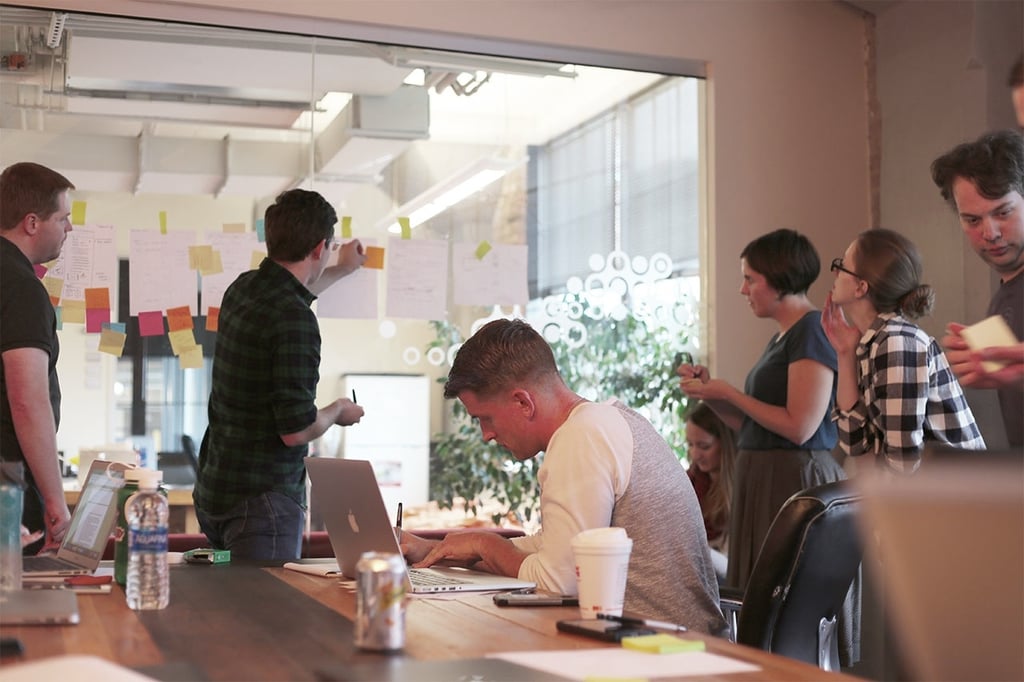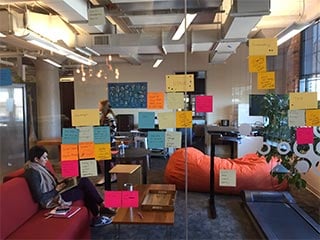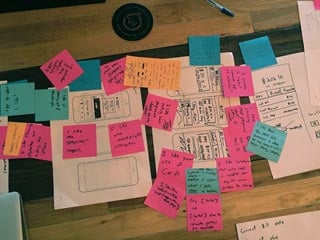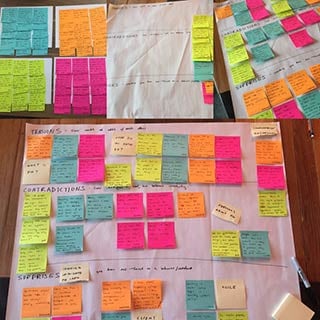Why Discovery Workshops are Way Better Than Meetings for Product Development

To put it simply, discovery can be defined as the work you (must) do before you build the thing. This is especially relevant if you work at a company that works on software products.
Discovery workshops are collaborative exercises made to help teams collect the information they need to make smart decisions. Think of a funnel where we are moving from larger abstract concepts to smaller bits of concrete ideation -- taking teams from “everything is possible” to “here’s what’s relevant”. Common discovery activities include:
- Developing innovative project solutions using “How Might We?” Brainstorming
- Defining project priorities with a KJ Session
- Synthesizing layout, functionality, and workflow concepts with Collaborative Sketching
- Distilling insights through Interview Analysis
These workshops are often done at the start of a project, like at the kick-off meeting, and are used throughout the beginning phase of a project. Discovery starts a project off right by forcing the project team to build a shared understanding of what they are building (and why).
Creating this foundational understanding reduces risk by shaping solid business and project goals. We work together to agree on priorities and start a reciprocal dialogue, so there is openness and transparency between the stakeholders and the team developing the product.
 KJ Session
KJ Session
 Collaborative Sketching
Collaborative Sketching
 Interview Analysis
Interview Analysis
Core Benefits of Discovery Collaboration
What is so great about having the project team spend time on these discovery workshops, anyway? Here are some of the direct benefits:
- Reduce the risk of building the wrong thing.
- Include a representative from every specialty (e.g., founders/c-suite, sales, user experience, design, engineering, quality assurance).
- Require all team members to participate equally through a well-designed workshop format.
- Hear many ideas from many backgrounds (everyone gets a chance to weigh in).
- Eliminate (or at least reduce) surprises, which means more alignment and less misunderstandings.
- Get real buy in. If you’re involved in hands-on product discovery, you are more likely to be highly engaged, build trust, and provide helpful support and ideas along the way.
- Grow as a team. When we do this work together we all benefit.
Establish Ground Rules for Attitude & Support
Discovery workshops are where we start to grow the relationship between us and our client partners. We’re in the same room - collaborating, sharing, questioning (and stinking, yes, this is a side effect of some solid collaboration) - together.
The attitude you bring to the discovery workshop is integral to its success. During discovery we value being open, introspective, thoughtful, creative, and respectful. It’s a good time to practice summarizing things in your own words and being transparent about what you understand, what you don’t understand, and your plan to gain understanding. When there is stress later on in the project we’re more likely to fall back on this style of interaction. Everyone is on the same team.
Package Your Data to Guide the Team
After your discovery workshop, you have all this wonderfully messy (in a good way) data. Try to distill it into some core Principles, Goals, and the ultimate Project Vision:
- Principles connect values to outcomes. We can measure our decision making, artifacts, etc. against our principles. These can be more like guiding concepts, “Be accessible at all costs” or “Make data actionable”.
- Goals help us begin to define what we want to build. These are measureable, like a percent increase in downloads.
- Vision is an aspirational description about what we want to accomplish together.
This framework can be used to write a story that is carried throughout the life of a project and will become engrained into the project team’s discussions, feedback, and solutions -- like a manifesto of sorts. The team is developing a shared language that is unique to the project.
Keep Discovery Data Close By
Some types of workshop activities, like sketching, naturally output artifacts that can be immediately used by whomever is taking the next step on a project -- this could be user experience, design, or engineering.
Your mileage will vary but it can be very useful to create lightweight documentation, like photographs of your sketches or a simple set of slides summarizing your discovery findings. Many of these artifacts can be used throughout a project to get feedback, reference when making a design decision, document process, inform annotational writing, and more.
Get with the Hype
Why am I so hype about discovery workshops? There is an art to choosing the most appropriate type of workshop for the type of project you’re doing. Whether you know a lot or only a little bit about your users, their primary goals, and the problem your system is solving, we can do discovery together. IMHO discovery workshops are the best way to reduce risk on a project by collaborating to build a shared understanding of what we’re building and why we’re building it.
Let us know if you are looking for some keen eyes and ears, and some solid discovery ideas to help with your digital project.

